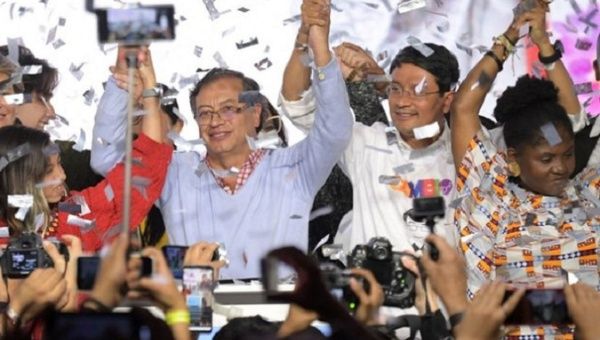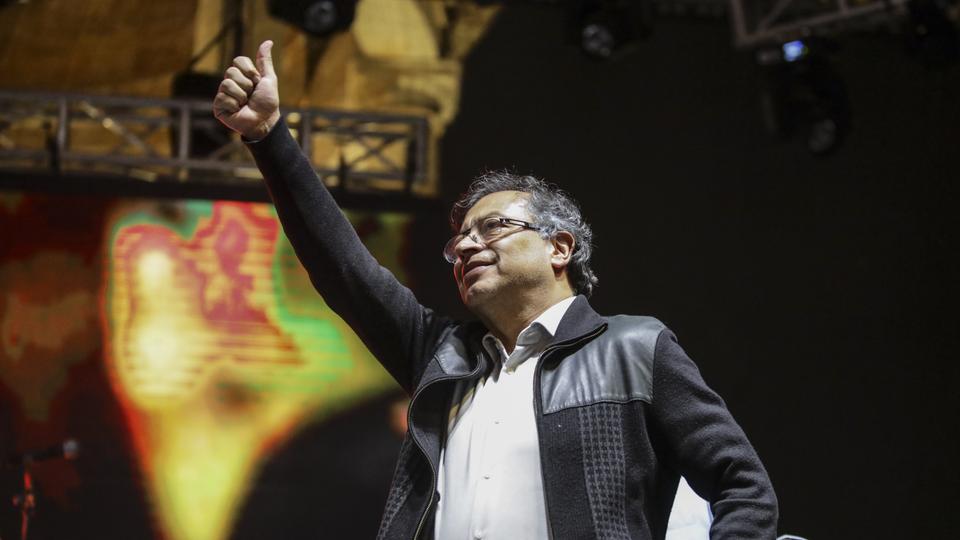
Historical Pact presidential candidate Gustavo Petro (C), March, 2022. | Photo: Twitter/ @theblazetrends
TELESUR
Published 14 March 2022
Regarding the presidential primary elections, the leftist senator Gustavo Petro prevailed this Sunday with over 80 percent of the votes.
On Sunday, the Historical Pact, a coalition that brings together the bulk of the Colombian left, won 17 seats in the Senate and 25 seats in the House of Representatives. In these elections, the big loser was the Democratic Center, a right-wing party led by former President Alvaro Uribe that had been the main political force in the country until now.
RELATED:
Colombia: Facing Illegal Political Campaigning
However, the Colombian right, although fragmented into six parties, will continue to be a majority in Congress, which will force the Historical Pact to seek alliances with the Green Alliance Coalition and the Hope Center, both of which have 14 seats in the Senate.
In the upper house, the rest of the positions were reached by the Conservative Party (15), the Liberal Party (15), the Democratic Center (14), Radical Change (11), the U Party (10) and the Coalition Mira-Colombia Free Fair (4).
In these elections, Colombians elected for the first time the representatives for the 16 Special Transitory Circumscriptions of Peace (CITREP), which are a mechanism designed so that the victims of the armed conflict can enter the House of Representatives.
Among the chosen leftist lawmakers are Maria Jose Pizarro, Alexander Lopez, Aida Avella, Roy Barreras, Ivan Cepeda, Isabel Zuleta, Esmeralda Hernandez, and Maria Fernanda Carrascal.
In the right-wing forces, the Democratic Center candidate Miguel Uribe Turbay, former Secretary of the Government of Bogota, was the most voted politician of all the candidates for the Senate. His party will be the predominant force with 19 senators.
In the Lower House, the Democratic Center lost 17 seats, going from 32 representatives to 15 in these elections. Another big loser on the right was "Radical Change", a party which barely got 11 seats in the Senate and 16 in the Lower House.
Regarding the presidential primary elections, the leftist senator Gustavo Petro prevailed this Sunday with over 80 percent of the votes, thus consecrating himself as the presidential candidate of the Historic Pact for the elections to be held in May, in which the Hope Center candidate Sergio Fajardo and the Liberal Party candidate Juan Galan will also take part.
Ex-guerrilla member Gustavo Petro leads the field to become the next president of Colombia, with leftist candidates projected to win most seats in the Senate.

Colombians have voted for senator and former guerrilla Gustavo Petro as the left's presidential nominee by a wide margin, making him the front runner in an election that could yield the country's first-ever leftist leader in May.
As predicted, the 61-year-old came out on top in the primaries on Sunday - called inter-party "consultations" - which took place alongside elections for the Senate and House of Representatives, currently in the hands of right-wing parties.
But leftist candidates were projected to win the most seats in Colombia's Senate, as well as contending for second place in the lower house, partial results showed.
With more than 90 percent of polling stations counted, the left's Historical Pact coalition is set to win 17 of the 102 seats in the upper house, according to electoral authority figures.
In the lower house, it looks set to take 25 of the 165 seats in a tie with the Conservatives and behind the Liberals.
Nearly 39 million of Colombia's 50 million inhabitants were eligible to vote in a complex but critical election in a country plagued by violence and growing poverty levels.
'Rejection of violence'
Outgoing President Ivan Duque - who called on Colombians to vote as a "rejection of violence" through the "triumph of democracy" - had promised safety "guarantees" for the non-compulsory vote.
The polls came with the president and legislature both at rock-bottom levels of public support.
Centrist Ingrid Betancourt, who was once held hostage by the guerrillas of the now-defunct Revolutionary Armed Forces of Colombia (FARC), won her coalition's nomination on Sunday. She presents herself as an alternative to both the ruling right and Petro.
Sunday's process is to yield three presidential contenders from 15 candidates hoping to represent groups of politically aligned parties - one each for the left, right and center. Three others have already been chosen by their respective groupings.
Six finalists will face off in a first round of presidential elections on May 29, which will be followed by a runoff on June 19 if no one wins an outright majority.
Petro came away with more than 80 percent of the vote for the Historical Pact coalition, winning against environmentalist Francia Marquez, who snagged 15 percent of the left's vote, to represent the group at the polls this spring.
Colombia election proceeding with no incidents, but with Web site failure

Bogota, Mar 13 (FE).- Colombian authorities reported Sunday that election day is proceeding without any major incidents or disturbances, despite failures in the Web page of the National Voter Registry, the organizer of the elections, although officials are – at present – ruling out a cyberattack.
Defense Minister Diego Molano held a press conference at the Unified Command Post and reported complete normality in all election-related security matters around the country.
The government has mobilized more than 241,000 soldiers and police nationwide to guard the 14,228 precincts.
Molano invited Colombians to participate in the election “with complete freedom and calm.”
The National Liberation Army (ELN) guerrilla group, which last month began an “armed halt” to its military activities in several regions of the country, declared a unilateral cease-fire for the election period, which began on March 10 and will run until midnight on the 14th.
On March 13, Colombians are heading to the polls to elect the members of the Senate and House of Representatives, as well as the presidential hopefuls from three political coalitions in a kind of primary.
Citizens in certain rural zones will also be able to select 16 representatives in a first-of-its-kind project of setting aside seats in Congress for people who suffered during decades of armed conflict.
Meanwhile, however, failures were reported on the Voter Registry’s Web site with users saying that they cannot check certain things, according to dozens of complaints posted on the social networks.
The Registry said that the failures of the platform were due to the large number of people attempting to access it or who were using it, adding that authorities are working to fully reestablish service.
Regarding these problems, the head of the National Police, Gen. Jorge Luis Vargas, said at a press conference that, so far, no reports have been received of any cyberattack on the Registry’s Web site, adding that the difficulties there seem to stem merely from technical issues.
In addition, he said that the Registry itself is operating normally and people may contact it directly to ask for voting information.
Given this incident, the cybernetic capabilities of the Defense Ministry have been strengthened to counteract any threat that might adversely affect election operations.
Nearly 400 candidates have thrown their hats into the ring for one of the 16 so-called “peace seats” now available in the lower house of Congress.
All of these seats are in Temporary Special Peace Districts (CITREP) established in rural areas that were particularly affected by the multisided conflict involving government forces, leftist guerrillas, right-wing paramilitaries and criminal organization seeking to exploit the five-decade-long war.
EFE
lmg/joc/lll/bp
No comments:
Post a Comment